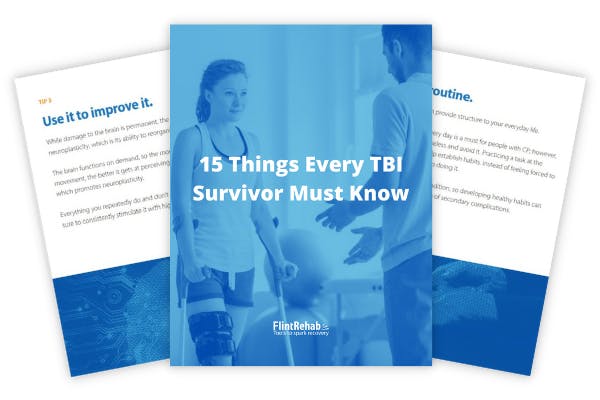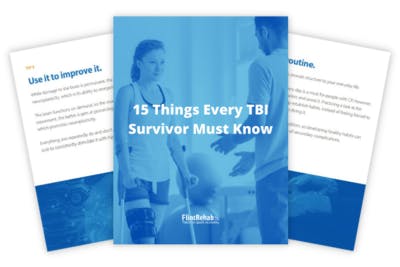No products in the cart.
No products in the cart.
No products in the cart.
No products in the cart.
Home » Neurological Recovery Blog » Traumatic Brain Injury » Understanding Brain Injury Organization Skills and How to Improve Them
Last updated on August 5, 2022

Organization skills are necessary for a person to live independently. Unfortunately, a brain injury can severely impair your ability to be organized.
The good news is that organizational skills can be rehabilitated after brain injury just like many other effects can. While many survivors commonly participate in physical therapy to improve movement, cognitive therapy isn’t quite as common, but it can be very helpful for recovering cognitive skills such as organization, memory, and attention.
This article will discuss how a brain injury affects organizational skills and how to boost recovery.
Organizational skills are crucial for everyday life and allow us to manage a job, maintain relationships, and remember important appointments.
Organization skills require the ability to:
These skills comprise a group of abilities known as executive functions. The frontal lobe controls executive function. Therefore, if damage to the frontal lobe occurs, a person may struggle with many of these skills, including the ability to stay organized.
This condition is formally known as executive dysfunction, and you should talk to your doctor or therapist to get an accurate diagnosis. Having difficulty concentrating on some days or simply being a “messy person” does not mean you have executive dysfunction.
Your occupational therapist and speech therapist are a particularly helpful resources for addressing issues related to cognitive function after brain injury.

Signs that you may be struggling with poor organizational skills include:
Poor organization may also be a symptom of cognitive fatigue after brain injury. Cognitive fatigue refers to your brain not having the energy needed to function efficiently.
This, again, is why it’s crucial to talk to your therapist for a formal diagnosis. When the brain is busy healing itself after brain injury, it may cause excessive sleepiness, fatigue, or other cognitive effects that make it difficult to stay as organized as before.
If you have been diagnosed with executive dysfunction after brain injury and wish to improve your organizational skills, there are plenty of steps you can take to get there.
Improved organizational skills may provide a greater sense of control over your life. This may reduce stress and depression, which are common problems after a brain injury.
There are two ways to improve organization skills after brain injury: compensation techniques and rehabilitation. Compensation techniques provide shortcuts that allow us to compensate for lack of ability. Rehabilitation helps address the root problem by improving the ability directly. Both are helpful during TBI recovery.
Here are ways to improve organization skills after TBI:

Creating a structured routine is crucial for improving your organization skills. A routine helps provide structure in your daily activities. This minimizes the amount of mental energy you spend and gives you more strength to tackle important tasks.
Having a routine makes a new task or behavior habitual, which lessens the amount of strain on your brain. Choose someone to assist you in planning your day in a productive manner. Having something concrete to look forward to often reduces anxiety and stress.
It is important that the schedule is realistic and doesn’t include so many activities that you become fatigued. It may take several adjustments to find the right balance. For example, if you are more tired in the afternoon, plan to do the most demanding activities in the morning, when you have the most energy.
Memory issues may also make organizing your day more difficult, so it’s important to write things down. Keeping a whiteboard or a calendar somewhere visible where you can easily find it is helpful Write down (or have a caregiver write down) all the appointments and activities planned for the day. When you complete something on the list, cross it off. This provides a sense of accomplishment and makes organizing your day more enjoyable and successful.
When attempting to finish a task, the most effective approach is to minimize distractions as much as possible. For example, if someone is easily distracted by noise, they might need to work in a quiet room. If that is not possible, wearing noise-canceling headphones might be a good alternative.
Some people tolerate noise, but the internet provides them an endless source of distraction. Fortunately, there are computer programs to download that can block access to certain websites during work hours. The more focused you are, the better organized you may become.

Cognitive exercises are an effective way to improve your mental organization. An excellent exercise to improve organizational skills is called task sequencing.
To practice task sequencing, have someone write down the steps to complete a certain activity, such as going to the park. But deliberately list these steps in the wrong order.
For example, the the steps might be listed as:
Next, rearrange the steps in the correct order. As your skills improve, select more complicated tasks, such as preparing a meal. Finally, write the steps down independently. This exercise teaches you how to organize your thoughts and problem solve.
You can also use apps that provide cognitive rehabilitation exercises, such as the CT Speech & Cognitive Therapy App. It was developed by two Speech-Language Pathologists to provide survivors access to affordable therapy right from home.
Organizing and planning may be more difficult after a brain injury, but they’re not impossible. With the correct strategies and techniques, you can begin to take control of your life again. Even with the perfect strategy, it may take time to see improvement, so be patient. With daily practice, your brain rewires itself and you may regain the organization skills you lost.

If you like our content, you’ll love our ebook and newsletters! Get instant access to our TBI recovery tips ebook with 20 pages of helpful advice by signing up below.
You’ll also receive our emails that share survivor stories and more useful TBI recovery tips, which you can opt out of at any time. (We know you’ll love them, too.)
We will never sell your email address, and we never spam. That we promise.


Time with a speech therapist is extremely valuable during recovery, especially if you struggle with communication, critical thinking, or memory after brain injury. Insurance typically covers speech therapy for a fixed amount of time. But once it’s over, recovery is in your hands.
That’s why a team of neuroscientists and clinicians from Boston University created the CT Speech & Cognitive Therapy app. Designed for those recovering from stroke, TBI, or living with neurological conditions, the app contains over 100,000 cognitive exercises that are all available right from your phone or tablet. That’s like having a speech therapist by your side whenever you want!
This app is the perfect fit if you want to improve your speaking, memory, or general mental sharpness. And, it’s affordable at just $29.99/month!
“For the past 6 months, my son has used the app about three times a week. The app is like a virtual therapist, it’s very easy to use, and it gives him immediate feedback.
He now understands things faster, can make decisions with less hesitation, has improved recognition of words, and his confidence is higher. I also find it easy to get in touch with customer service; they pleasantly help out. The whole experience has been great.”
— Miriam
With the CT App, you can get the guidance you need right from your phone or tablet. You can use it on your own or in between sessions with your speech therapist.
Whether you struggle with aphasia, memory loss, or critical thinking, the CT Speech & Cognitive Therapy App can help.
“The CT app has helped me gather my confidence by building on and reinforcing old forgotten skills. It helps to see my percentages increase, and work harder when they decrease. It’s very self-motivating.” -Kathryn
We are confident that this app will help improve your speech and cognitive function after brain injury. Like our recovery tools, the CT App is also covered by our 30-day money-back guarantee.

Do you know these 15 TBI recovery tips?
Get a free copy of our ebook 15 Things Every TBI Survivor Must Know. Click here to get instant access.
Grab a free rehab exercise ebook!
Sign up to receive a free PDF ebook with recovery exercises for stroke, traumatic brain injury, or spinal cord injury below: